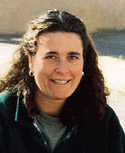|

Adrienne Onofri
|
|
Hope at the Edge of the Abyss
Alumna who teaches near the World Trade Center site takes solace
from her students.
by Adrienne Onofri
One thing my two alma maters have in common, I had been saying since I
went to Pace University for graduate school, is a great view. While Northwestern
has Lake Michigan and the Chicago skyline, at Pace there is a vista of
the splendid trio of bridges that span the lower East River and the steeples
of Lower Manhattan: City Hall, the Woolworth Building and, three blocks
from campus, the twin towers of the World Trade Center.
On Sept. 11 that view gave Pace’s students, faculty and employees
a front-row seat to history and terror. I was on campus that morning,
beginning my third year as an adjunct instructor. In the weeks that followed,
I would have to reassure my students, get them back on track in their
lives and schoolwork and help them to both understand the myriad issues
related to the tragedy and to learn from it.
The first challenge was maintaining my composure, and I actually did manage
to get through the semester dry-eyed. The hardest time was when a student
assistant, who had been so vivacious when the school year began, sobbed
about being unable to sleep after seeing bodies hurtling through the air.
With their teenage bravado many students were reluctant to admit their
rage and fear. Or they believed that not talking about it would make it
go away. One day I faced a chorus of "Why do you keep bringing this
up?" Several complained about the 9/11-related classwork they were
getting: "We just want to forget about it and get on with our lives."
My first instinct was to respond, "It’s not that simple!"
I wanted them to understand the implications of the incident, to think
about issues like human rights, foreign policy, religious extremism. The
assignments I had given dealt with what the events of 9/11 and afterward
showed us about human nature and how our cultural life and personal conduct
have been altered by the experience.
There were, of course, moments of candor from the students about their
anxiety. One confessed, "I’m afraid ... of everything. Of going
to sleep and not waking up, of a plane flying into my building, of leaving
home and never returning." A few students from Brooklyn occasionally
stayed home to avoid taking the subway or crossing a bridge.
This year’s first-year students were just starting grade school when
the Cold War ended, so they’d grown up without the specter of nuclear
annihilation and in a period mostly of economic prosperity. Now their
sense of security was shattered. Four Pace students and more than 30 alumni
were killed on Sept. 11, and about 250 students withdrew from school,
citing the attacks as the reason.
Those who remained carried on in a truly distressing environment for a
U.S. campus. As one of my students wrote in her journal in mid-October:
"It’s not normal to head to school where you see soldiers and
policemen stationed at every corner as though it is a war zone. It is
not normal to wake up hoping for a breath of fresh air but instead you
wake up to a strong odor of smoke and of the dead."
Yet these journals, as well as class discussions and even just the sight
of students gathered, smiling, in the lounge or on the plaza, showed their
resolve to have all the experiences that come with being a college student.
"In life one may take many chances, and I am definitely taking mine,"
one of my students wrote. "This attack is not going to stop me from
succeeding."
While many students advocated revenge, they nonetheless raised thoughtful
questions about harming civilians as the terrorists had done, and about
the United States’ putative invulnerability before the 11th.
Perhaps the most generous reactions came from two students whose fathers
had died earlier in the year. One young man pitied the families of 9/11
victims because they didn’t get to say goodbye or to bury their loved
ones. The other, whose father passed away after a long illness, wrote,
"On Sept. 11, we didn’t have the opportunity to prepare ourselves
for the inevitable."
Teaching at Pace put me in the midst of tragedy, but working with these
young people has given me a purposefulness I’d be hard-pressed to
get elsewhere. Being so close to ground zero allowed me to pay my respects
to those who perished. And my students’ fortitude and optimism heartened
me in a way I had never imagined.
Adrienne Onofri (J85) received a master’s degree in education
from Pace University in 1997. In addition to teaching, she is a freelance
writer and editor, specializing in travel, entertainment and social issues.
RETURN TO TOP
|


